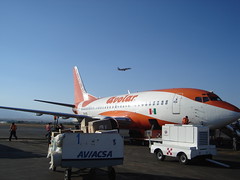
A jet from the defunct carrier Avolar sits by the terminal at the Oaxaca airport
Airline pilots and staff marched through Terminal 1 of the Mexico City airport on Sunday, demanding that money-losing carrier Mexicana de Aviación leave its employees' generous salary and benefit packages intact and stating emphatically that they're not to blame for the company's problems.
In short, Mexicana is going broke and is asking pilots and flight attendants to take cuts to their salaries and benefits. The airline also proposed job cuts and asked that its pilots buy the airline for one peso (less than 10 cents.) The pilots rejected those offers.
The pilots and flight attendants at Mexicana are very well paid - and their salaries are among the most lavish in the industry. The Mural newspaper reported Mexicana pilots earn more than $220,000 per year - far more than their counterparts in the U.S., who earn an average of $150,000 per year. Mexicana is asking its pilots to take a 41 percent pay cut. Flight attendants were asked to take a similar pay cut from their wages of $52,000 per year.
Mexicana is deeply in debt and a Canadian creditor recently had two Mexican carriers planes ordered held while at airports in Calgary and Montreal, forcing the cancellation of flights. Any problems at Mexican only impact the mainline operations, which is responsible foreign flights and many of the runs between Mexico City and the destinations of Tijuana, Monterrey and Cancún. Domestic operations on Mexicana subsidiaries Mexicana Click and Mexicana Link are unaffected and employee costs on those fleets are substantially less than on the mainline carrier.
All of the Mexicana action comes as the FAA downgrades Mexico's air safety rating. It launched the review following the November 2008 crash of a private jet in the swank Lomas de Chaputepec neighbourhood that claimed the life of the then interior minister Juan Camilo Mouriño.
The Mexican aviation has long been financially troubled as Mexicana and rival AeroMéxico were government-owned, but operated as separate units, from the mid 1990s - following the peso crisis - until Mexicana was sold in 2005. AeroMéxico was sold in 2007. Other airlines to go bust in recent years include AeroCalifornia - famed for flying old planes and providing tardy service - Aerolineas Azteca, Aviacsa, Alma de México and Avolar.
Two lower-cost airlines have flourished, however: Interjet and Volaris - both of whose costs are much lower than those at Mexicana or AeroMéxico. Carlos Slim recently sold his share of Volaris, prompting questions about the state of the industry. (Slim's not known to abandon a good investment.)
Or perhaps aviation is just too competitive. Slim, of course, has become fabulously wealthy operating in the competition free - at least it was for decades - domestic telecommunications market. (Slim likes to boast how his companies face stiff competition in other markets and is facing growing competition in Mexico.) But while the government abides businessmen like Slim and monopolistic companies in sectors such as broadcasting, brewing and cement, it steadfastly refuses to allow consolidation in the aviation sector and permit the creation of a flag carrier.
With Interjet and Volaris on the scene, the new flag carrier would face at least some competition from companies being operated much more efficiently than either AeroMéxico or Mexicana. But for mysterious reasons, aviation remains the one industry in which the government refuses to allow consolidation.


No comments:
Post a Comment